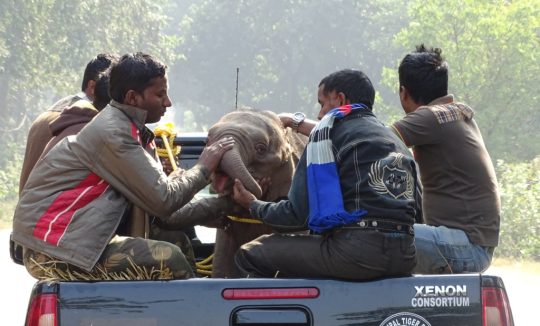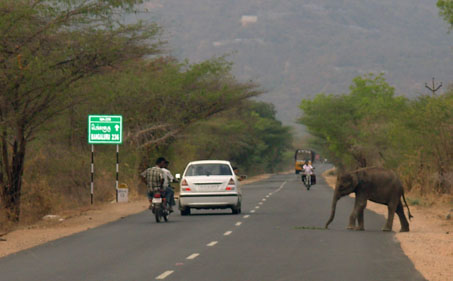Project Info
Project Description
Biodiversity, natural landscapes and resources provide critical ecosystem services, essential for human health and well-being. However, these landscapes are increasingly threatened by various anthropogenic pressures, land-use changes, and the impacts of climate change. Even Protected Areas (PAs), designated for nature and biodiversity conservation, face threats that lead to habitat fragmentation and degradation, significantly affecting biodiversity conservation and ecosystem functioning, thus posing challenges for PA managers.
In response to these challenges, the USAID-funded ‘Strengthening Landscape Management and Conservation’ (SLMC) Project was launched in 2023. The project aims to enhance the management of ecological landscapes for biodiversity conservation, human well-being, and climate resilience in targeted regions (see SLMC’s Theory of Change below). The project is being implemented by a consortium of four organisations—Winrock International (Lead Organization), Wildlife Trust of India (WTI), IORA Ecological Solutions, and Vertiver Communications.
SLMC’s Theory of Change
The project comes with three key objectives:
- Improving the management of protected areas and connected landscapes for wildlife habitat and other ecological benefits.
- Enhancing inclusive livelihoods derived from ecosystem services.
- Supporting the institutionalisation of systems, practices, and legal frameworks that underpin biodiversity conservation and effective landscape management.
WTI is responsible for implementing activities under “Improving the management of protected areas and connected landscapes”, across the project locations in Central India, the Western Ghats, and Odisha. The Central Indian landscape focuses on the Bandhavgarh Tiger Reserve, Sanjay Tiger Reserve, Shahdol Forest Division (Madhya Pradesh), and Guru Ghasidas National Park along with Tamor Pingla Wildlife Sanctuary (Chhattisgarh). The Western Ghats landscape spans across Kerala, Tamil Nadu, and Karnataka. In Odisha, the project covers PAs and territorial forest areas in Baripada and Angul forest circles. The project focuses on long-ranging animals such as tigers and elephants, that face challenges related to human-wildlife conflict and habitat degradation. Consequently, it involves an inclusive, long-term and multidimensional approach to threat mitigation.
Under the SLMC project, WTI will assess the management capacity of PAs and collaborate with state forest departments to enhance their management effectiveness. This includes capacity-building for forest staff, co-developing and piloting habitat management interventions, and improving habitat monitoring through protocol development and training. Additionally, the project focuses on empowering frontline forest staff and officials with mobile technology for effective monitoring, addressing direct threats like poaching and retaliatory wildlife killings, mitigating human-wildlife conflicts, and ensuring robust biodiversity monitoring to strengthen landscape-level management.

Wild elephant in Similpal Tiger Reserve, Odisha | Photograph by Sumanta Kundu
The SLMC project also emphasises the management and governance of forest and wildlife habitats outside PAs by strengthening community-based institutions such as Joint Forest Management Committees and Biodiversity Management Committees. By fostering institutional capacity, the project aims to improve connectivity between PAs through corridor management plans, identifying threats to structural and functional connectivity and enhancing inter-state collaboration. A cadre of “Green Corridor Champions” (GCCs) will be trained to monitor corridors and engage communities in conservation efforts.
To address Human-Wildlife Conflict (HWC), specific measures will be implemented, including mapping conflict hotspots (spatially and temporally), co-developing cost-effective early warning systems, mobilising local volunteers as Primary Response Teams (PRTs), and suggesting improvements in compensation/ex-gratia/relief processes. The project will also pilot alternative crops and cropping patterns to reduce losses due to crop depredation.
Partners: USAID, Winrock International
Project Lead: Dr. Samir Kr. Sinha











